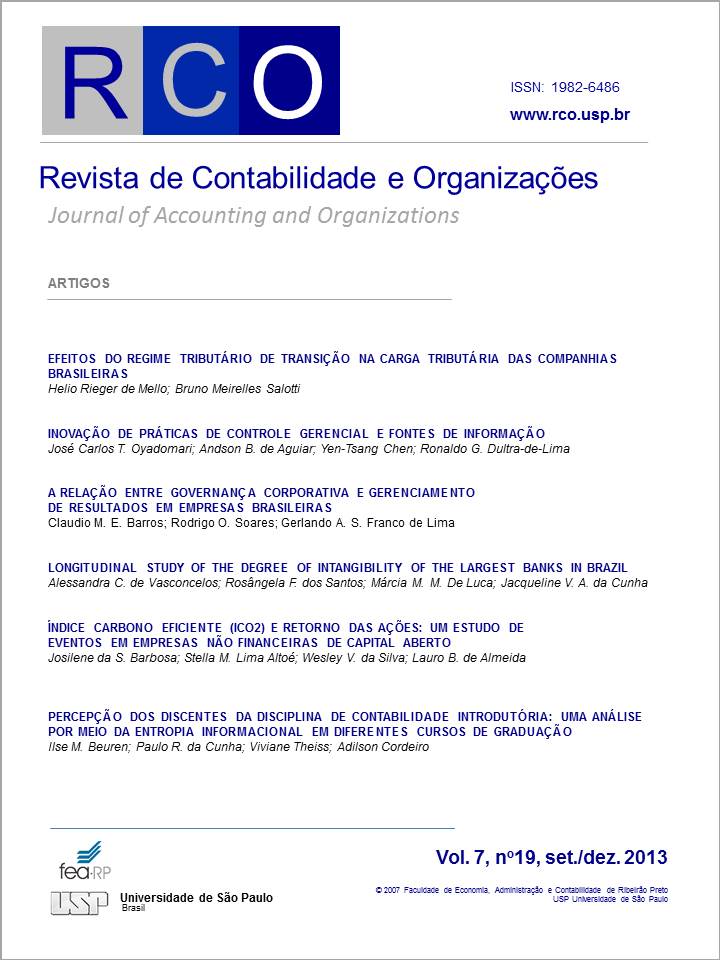ACCOUNTING AND TAXABLE INCOMES: EFFECTS OF TRANSITION TAX REGIME (RTT)
DOI:
https://doi.org/10.11606/rco.v7i19.55517Keywords:
accounting income, taxable income, Transition Tax Regime (RTT).Abstract
Law 11.638/07 represents the beginning of convergence of Brazilian accounting practices towards international standards established by the International Accounting Standards Board (IASB) introducing significant changes, such as implementation of the principle of essence over form – in other words, the prevalence of an economic outlook on financial accounting – whereas a civil stance was adopted mostly for tax accounting, which conversely focuses on form.As the new accounting rules would have a positive, null or negative impact on taxable income, the Transition Tax Regime (RTT) was established as of 2008. The aim was to neutralize all new criteria for recognizing revenues, expenses or costs.Companies had the option to adopt this new regime or not along 2008-2009, however, adoption became mandatory as of 2010. Nevertheless, companies found it difficult to carry the process through due to the original term, which expired on October 16th, 2009, before the end of the last quarter, and issues concerning the interpretation of the new accounting standards and their effects on tax legislation.The main purpose of this article is to analyse the effect of RTT on taxable income and accounting income in 2008 and 2009 and compare them with a mean of period 2005 to 2007 for taxable income companies that did not opt for this Regime, broken down into four sectors: agriculture, commerce, industry and services.The methodology was based on data from 2005 to 2009 authorized by Federal Treasury and the study sample consisted of 69,712 taxable income companies (65%) that did not opt for the RTT.On April 13th, 2010, Normative Instruction 1.023/10 extended the initial deadline however from these amendments, only 973 companies decided to adopt the RTT, suggests that a good analysis of the accountants.By comparing the period of 2008-2009 to that of 2005-2007, the value of five variables was obtained, namely, taxable income, accounting income, the difference between them, gross revenue and gross profit. Evidences has found that the companies that did not opt for the RTT paid less income tax (IRPJ) and social contribution on net profit (CSLL) in 2008-2009.Downloads
Downloads
Published
Issue
Section
License
The RCO adopts the Free Open Access policy, under the standard Creative Commons agreement (CC BY-NC-ND 4.0). The agreement provides that:
- Submission of text authorizes its publication and implies commitment that the same material is not being submitted to another journal. The original is considered definitive.
- Authors retain the copyright and grant the journal the right of first publication, with the work simultaneously licensed under the Creative Commons Attribution License which allows the sharing of the work with acknowledgment of authorship and initial publication in this journal.
- Authors are authorized to take additional contracts separately, for non-exclusive distribution of the version of the work published in this journal (e.g. publish in an institutional repository or as a book chapter), with necessary recognition of authorship and initial publication in this journal.
- Authors are allowed and encouraged to publish and distribute their work online (e.g. in institutional repositories or on their personal page) before or during the editorial process, as this can generate productive changes as well as increase the impact and citation of published work (See The Effect of Free Access).
- The journal does not pay copyright to the authors of the published texts.
- The journal's copyright holder, except those already agreed in the Free Open Access Agreement (CC BY-NC-ND 4.0), is the Accounting Department of the Faculty of Economics, Administration and Accounting of Ribeirão Preto of the University of São Paulo.
No submission or publication fees are charged.
Up to 4 authors per article are accepted. Exceptionally duly justified cases may be reviewed by the Executive Committee of the RCO. Exceptional cases are considered as: multi-institutional projects; manuscripts resulting from the collaboration of research groups; or involving large teams for evidence collection, construction of primary data, and comparative experiments.
It is recommended that the authorship be ordered by contribution of each of the individuals listed as authors, especially in the design and planning of the research project, in obtaining or analyzing and interpreting data, and writing. Authors must declare the actual contributions of each author, filling the letter to the editor, at the beginning of the submission, taking responsibility for the information given.
Authors are allowed to change throughout the evaluation process and prior to the publication of the manuscript. The Authors should indicate the composition and final order of authorship in the document signed by all those involved when accepted for publication. If the composition and authoring order is different than previously reported in the system, all previously listed authors should be in agreement.
In the case of identification of authorship without merit or contribution (ghost, guest or gift authorship), the RCO follows the procedure recommended by COPE.








